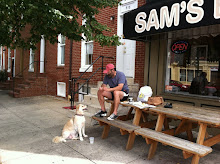It was October in Baltimore, and it felt like July. The grass was brown, people were waiting for autumn. People were waiting for things to change. I was at the university hospital and decided to eat lunch outside, away from the residents in their green coats, the visitors wearing name tags, and the faces sometimes in smile, but often with an empty look.
I sat under a tree where even the shade was hot. As I raised the fruit juice bottle to my lips and tilted my head backwards, my eyes stopped upon the window, on the last level of the building. The window through which the last July rays fell upon Ani’s face, a hot day in July, more than 2 years ago. Her eyes were already shut; her breath was among the last ones she would ever take. Yet I recall the faint ray upon her face.
I knew I would look at the window. That is why I sat there. The excuse of eating away from the crowd was just that—an excuse.
As I was reliving the moments, as I often do, from behind the glass panels of the corridor, I saw a young girl in a wheelchair, an IV bag hanging on the pole, her dad pushing the chair. I could only see her from the back; I could only see her for a few seconds. And there I was, pushing the wheelchair, an IV bag hanging on a pole, a 12 year old girl in the wheelchair.
… That day, Ani’s kidneys were on strike. That day Ani knew that things were not getting better. So she wanted to go “for a walk” in the wheelchair. Wearing the oxygen mask, her now pale and yellowish arms feeding on IV lines, I convinced the nurses to let us go for that walk. A short one, I promised.
As I was looking at the bold spots on the back of her head, trying to sound optimistic and making silly jokes, I realized that such ”walks” may not happen again.
“Would you like something special to eat, sweetheart?”
Ani turned her head back, and with the mischievous looks of a 12-year old girl she said:
“Daaad! You know I cannot have anything”.
“Oh yes, you can! All these drugs will clean things out. Tell me, you want something?”
Perhaps she knew the game. Perhaps Ani was stronger than I was. Perhaps she did not see the fog in my eyes but knew it was there.
“You know dad, I would love a Cappuccino…”
I pushed the wheelchair toward the coffee kiosk in the lobby.
“A Cappuccino for the young lady” I asked “and another one for this old man.”
… Ani could drink only a sip. Yet, the milk froth drew that moustache line upon her chapped lips.
“That was goooooood!” she said, even though she was already feeling weak and tired and wanted to go back to her room.
“Best Cappuccino I ever had with a beautiful young lady,” I agreed.
Ani’s kidneys were on strike. I knew a sip of coffee would not have mattered.
… So, on this October day, I drank my fruit juice. And I looked at the window. I was sure another child was in the bed by that PICU unit, next to that window.
“I hope that child will make it,” I almost murmured. “I hope so with all my soul.”
October 10, 2007
